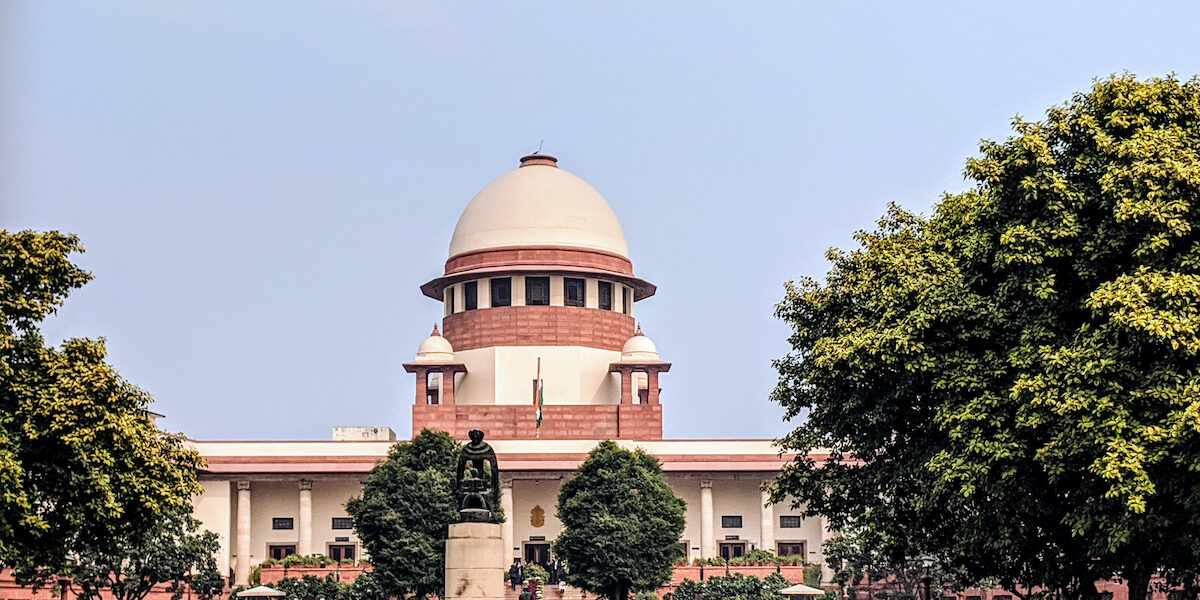The Supreme Court’s decision follows rising concerns over growing lawsuits regarding religious site ownership, particularly medieval mosques and dargahs. Recent violence, including deadly clashes triggered by a survey of a 16th-century mosque in Sambhal, highlighted the issue
Published Dec 12, 2024 | 8:05 PM ⚊ Updated Dec 12, 2024 | 9:41 PM

The Supreme Court of India. (iStock)
In a significant ruling on Thursday, 12 December, the Supreme Court of India directed that civil courts across the country refrain from hearing cases challenging the ownership and title of places of worship.
This includes high-profile disputes such as the Gyanvapi mosque in Varanasi and the Krishna Janmabhoomi temple in Mathura.
#BREAKING In a significant decision, #SupremeCourt directs that till it decides the case on #PlacesofWorshipAct , no other court shall:
1. Register any fresh suits
2. pass any effective final orders or interim order
3. No decision of surveying any area etc pic.twitter.com/OsNXJMD72v— Bar and Bench (@barandbench) December 12, 2024
The bench, led by Chief Justice of India Sanjiv Khanna, stated, “We deem it fit to direct that no fresh suits shall be registered, nor any proceedings ordered. In pending suits, no effective interim orders or final orders, including orders of survey, can be granted by civil courts until the next date of hearing.”
This decision comes amidst rising concerns over the growing number of suits related to the ownership of religious sites, particularly in the context of medieval mosques and dargahs.
The Court’s intervention followed increasing instances of violence triggered by such disputes. Notably, a survey order issued by a trial court against a 16th-century mosque in Sambhal, Uttar Pradesh, resulted in deadly violence in November, claiming at least four lives.
The special bench, comprising Chief Justice Khanna, Justice Sanjay Kumar, and Justice KV Viswanathan, was hearing a batch of writ petitions challenging the constitutional validity of the Places of Worship (Special Provisions) Act, 1991.
The Act prohibits the conversion of the religious character of places of worship from their status as of August 15, 1947, effectively freezing the status quo of religious sites at the time of India’s independence.
During the proceedings, Justice Viswanathan emphasised to Solicitor General Tushar Mehta that the larger question at hand was the constitutional principles embedded in Section 3 of the Act, which bars changes in the religious character of places of worship.
He added that civil courts should not be allowed to override Supreme Court decisions, stating, “Civil courts can’t run a race with the Supreme Court.”
The Court was informed that at least 18 suits are currently pending, targeting 10 mosques and shrines across the country. The ongoing legal battles, particularly concerning mosques like Gyanvapi and disputes over the Krishna Janmabhoomi, have drawn significant public and political attention.
The Places of Worship Act has been the subject of growing controversy, especially in light of recent events in Uttar Pradesh, where a survey at the Sambhal Jama Masjid led to violent clashes. The Supreme Court’s ruling has placed a temporary halt on any legal actions that could potentially alter the status of such religious sites.
Several political parties, including CPI(M), Indian Union Muslim League, DMK, and RJD, as well as leaders like Sharad Pawar and Jitendra Awhad, have intervened in the case, advocating for the protection of the Act.
DMK, ruling party in Tamil Nadu also moves SC to protect ‘Places of Worship Act’. https://t.co/mpZDRIjKxl
— Arvind Gunasekar (@arvindgunasekar) December 12, 2024
In response to the ongoing proceedings, the Union Government has yet to file its counter-affidavit, despite multiple extensions from the Court. A writ petition filed by Jamiat Ulema-i-Hind seeking the implementation of the Act was also considered during the hearing.
The Court appointed Advocates Kanu Agarwal, Vishnu Shankar Jain, and Ejaz Maqbool as nodal counsel to compile information on behalf of the Union, petitioners, and those supporting the Act.
(Compiled by Ananya Rao)
